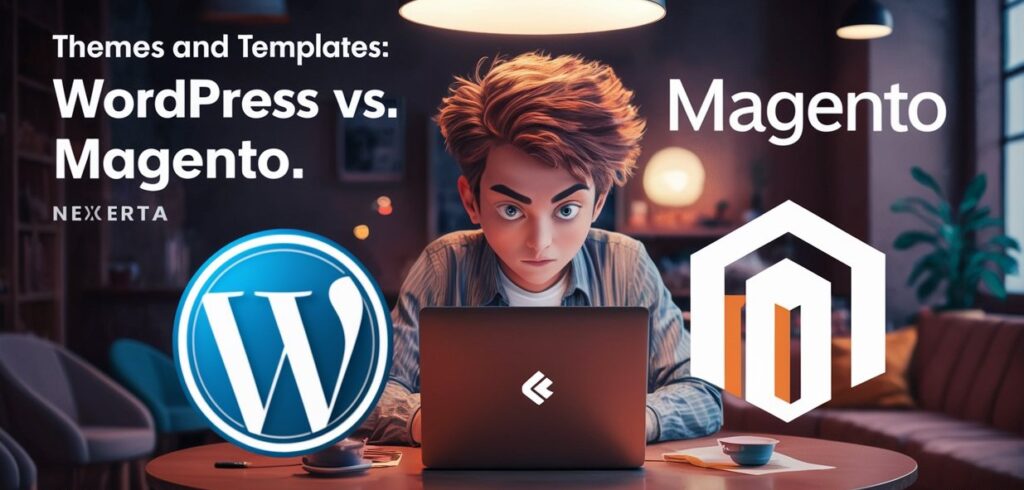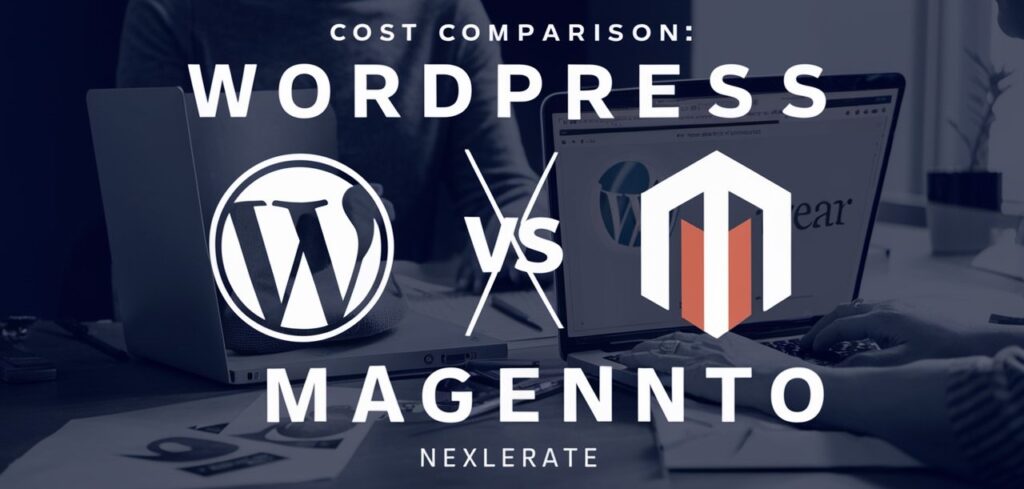Introduction to WordPress and Magento
When building an online store, choosing the right platform is crucial for your business’s success. Two of the most popular options available are WordPress and Magento. Both platforms offer unique features and benefits, but deciding which is right for your business can be challenging. In this blog post, we’ll compare WordPress vs Magento in various aspects to help you make an informed decision.
Table of Contents
Overview of WordPress
WordPress is a widely used content management system (CMS) that powers over 40% of all websites on the Internet. Originally designed as a blogging platform, WordPress has evolved into a versatile CMS that handles various websites, including e-commerce stores. With the WooCommerce plugin, WordPress transforms into a powerful e-commerce platform that allows you to sell products and services online.
Overview of Magento
Magento, on the other hand, is a dedicated e-commerce platform designed to handle large-scale online stores. It is known for its robust features and scalability, making it a popular choice for medium to large businesses. Magento offers two versions: Magento Open Source (formerly Magento Community) and Magento Commerce (formerly Magento Enterprise). While Magento Open Source is free, Magento Commerce is a paid version with additional features and support.
WordPress vs Magento: Key Differences
WordPress and Magento differ in critical areas, including their core functionalities, ease of use, customization options, and scalability. WordPress is a versatile CMS that can handle various websites, while Magento is specifically designed for e-commerce. This fundamental difference shapes how each platform operates and the types of businesses they are best suited for.
Ease of Use: WordPress vs Magento
WordPress is known for its user-friendly interface and intuitive design, making it accessible to users of all skill levels. The platform offers a simple dashboard to easily manage your website’s content, products, and settings. Magento, however, has a steeper learning curve due to its complex features and advanced functionalities. While it provides powerful tools for managing an online store, it may require more technical expertise to navigate and customize.
Customization and Flexibility
WordPress and Magento offer a high degree of customization and flexibility, but they do so differently. WordPress relies on themes and plugins to extend its functionality and design, allowing you to create a unique website tailored to your needs. With thousands of free and premium themes and plugins available, you can easily add features and customize your site. Magento, on the other hand, provides extensive customization options through its modular architecture. Developers can create custom modules and extensions to enhance the platform’s capabilities, making it highly flexible for complex e-commerce needs.
Themes and Templates: WordPress vs Magento

WordPress offers a vast selection of themes and templates that cater to various industries and design preferences. Many themes are designed with e-commerce in mind and can be easily customized to match your brand. Magento also provides a range of themes and templates, but its selection is more limited than WordPress’s. However, Magento’s themes are specifically designed for e-commerce and offer advanced features for online stores.
Plugins and Extensions: WordPress vs Magento
Plugins and extensions play a crucial role in extending the functionality of both WordPress and Magento. WordPress boasts a massive library of plugins, with over 58,000 available in the official repository. These plugins cover many features, from SEO optimization to e-commerce tools. While having a smaller selection, Magento offers powerful extensions designed to enhance its e-commerce capabilities. Both platforms allow third-party integrations, but Magento’s extensions are often more tailored to advanced e-commerce needs.
Performance and Speed Comparison
Website performance and speed are critical factors for online success. WordPress sites can achieve fast loading times with proper optimization and caching plugins. However, because WordPress relies on multiple plugins to add functionality, it can sometimes lead to slower performance if not managed properly. Magento is known for its robust performance, especially for large-scale e-commerce stores. Its architecture is optimized for handling high traffic and large product catalogs but requires proper server resources and configuration to maintain optimal speed.
SEO Capabilities: WordPress vs Magento
WordPress and Magento offer strong SEO capabilities, but WordPress has a slight edge due to its flexibility and the availability of powerful SEO plugins like Yoast SEO. WordPress lets you easily optimize your content, meta tags, and URLs, making it a favorite among SEO professionals. Magento also provides comprehensive SEO tools, including customizable URLs, meta tags, and sitemaps, but it may require more technical expertise to utilize its SEO features fully.
Security Features and Measures
Security is a top priority for any online business. WordPress offers various security plugins and best practices to protect your site from threats. Regular updates and a large community of developers help ensure that vulnerabilities are quickly addressed. Magento, being a dedicated e-commerce platform, places a strong emphasis on security. It offers built-in security features like secure payment gateways and advanced user permissions. Magento Commerce also provides additional security patches and updates for enterprise users.
Cost Comparison: WordPress vs Magento

The cost of using WordPress and Magento depends on various factors, including hosting, themes, plugins, and development. WordPress is generally more cost-effective, especially for small to medium-sized businesses. The platform is free, and you can find many free themes and plugins. However, premium themes, plugins, and custom development can add to the cost. Magento Open Source is also free, but Magento Commerce comes with a significant price tag, making it more suitable for larger businesses with bigger budgets.
Scalability for Growing Businesses
Scalability is a crucial consideration for businesses planning to grow. WordPress can handle moderate traffic and product catalogs with proper optimization and hosting. However, as your business grows, you may encounter limitations in performance and scalability. Magento is designed to scale seamlessly with your company. Its robust architecture and advanced features make it capable of handling large product catalogs, high traffic, and complex e-commerce operations.
Community and Support: WordPress vs Magento
Both WordPress and Magento have active communities and extensive support resources. WordPress’s large user base and community forums provide information and assistance. Numerous tutorials, documentation, and third-party support options are also available. Magento’s community is smaller but highly specialized. It offers official documentation, forums, and a dedicated support team for Magento Commerce users.
E-commerce Features and Functionalities
With the WooCommerce plugin, WordPress provides essential e-commerce features such as product management, payment gateways, and shipping options. It is ideal for small to medium-sized online stores. As an e-commerce-focused platform, Magento offers advanced features like multi-store management, custom pricing, and complex product configurations. It is better suited for businesses with more extensive e-commerce needs.
Content Management and Blogging
WordPress excels in content management and blogging thanks to its origins as a blogging platform. It offers powerful tools for creating and managing content, making it an excellent choice for businesses prioritizing content marketing. While providing basic content management features, Magento is less robust than WordPress in this area. WordPress is better if blogging and content marketing are central to your strategy.
Multilingual and Multi-currency Support
WordPress and Magento offer multilingual and multi-currency support, but they do so differently. WordPress relies on plugins like WPML or Polylang to add multilingual capabilities, while WooCommerce extensions handle multi-currency support. Magento has built-in support for multiple languages and currencies, making it easier to manage international stores.
Integration with Third-party Tools
Integrating third-party tools and services is essential for expanding your store’s functionality. WordPress has a wide range of plugins that enable seamless integration with various tools, such as email marketing services, CRM systems, and payment gateways. Magento also offers extensive integration options, with many extensions for connecting to third-party services. Both platforms provide APIs for custom integrations, but Magento’s architecture is more geared towards complex integrations.
User Experience and Customer Support
User experience and customer support are vital for maintaining a successful online store. WordPress offers a user-friendly interface and many themes to enhance user experience. WooCommerce provides essential e-commerce features, but customer support is typically handled through community forums and third-party providers. Magento offers a more robust user experience for large-scale stores, with advanced features and customizable interfaces. Magento Commerce users also benefit from dedicated customer support and additional resources.
Case Studies and Success Stories
Examining case studies and success stories can provide valuable insights into how each platform performs in real-world scenarios. Many successful online stores, such as The New York Times Store and TechCrunch, use WordPress to power their e-commerce operations. Magento powers notable brands like Nike, Ford, and Coca-Cola, showcasing its ability to handle large-scale e-commerce needs. Analyzing these success stories can help you understand which platform aligns better with your business goals.
Pros and Cons of WordPress
Pros:
- User-friendly interface
- Extensive theme and plugin library
- Robust content management and blogging capabilities
- Cost-effective for small to medium-sized businesses
- Large and active community
Cons:
- It may require multiple plugins for advanced e-commerce features
- Performance can be affected by excessive plugins
- Limited scalability for large-scale stores
Pros and Cons of Magento
Pros:
- Advanced e-commerce features and functionalities
- Highly scalable for growing businesses
- Robust performance and speed
- Strong security measures
- Built-in multilingual and multi-currency support
Cons:
- Steeper learning curve
- Higher cost, especially for Magento Commerce
- Requires technical expertise for customization and management
- Smaller community compared to WordPress
Choosing the Right Platform for Your Business Needs
Choosing WordPress and Magento depends on your business’s specific needs and goals. If you are a small to medium-sized business looking for a cost-effective and user-friendly platform with solid content management capabilities, WordPress with WooCommerce is an excellent choice. On the other hand, if you are a medium to large business with complex e-commerce needs, high traffic, and a focus on scalability, Magento is the better option.
Conclusion: WordPress vs Magento – Which is Better for You?
Ultimately, the decision between WordPress and Magento comes down to your business requirements, budget, and long-term goals. Both platforms offer unique advantages and can support the growth of your online store. By carefully considering the factors discussed in this blog post, you can make an informed decision and choose the platform that best aligns with your business needs.
Choosing the right platform is critical in building a successful online store. Whether you opt for WordPress’s versatility or Magento’s robust e-commerce capabilities, investing time in understanding each platform’s strengths and limitations will help you create a thriving online business.
